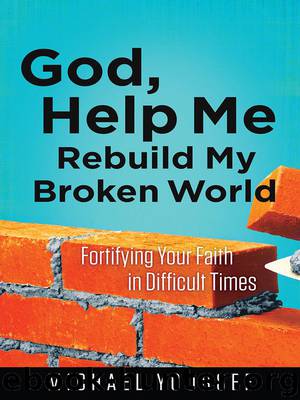God, Help Me Rebuild My Broken World by Michael Youssef

Author:Michael Youssef
Language: eng
Format: epub
ISBN: 9780736955843
Publisher: Harvest House Publishers
5
Freedom from Financial Bondage
Darius I (550–486 BC) was one of the great kings of Persia and the grandfather of the Persian king Artaxerxes, who is described in the book of Nehemiah. He conquered the Babylonian Empire in approximately 516 BC. When Darius arrived in Babylon to be received as the conquered nation’s new king, he saw the tomb of the Queen Nitocris, whose husband, Nebuchadnezzar, had conquered Jerusalem. The queen’s tomb bore the inscription, “If any king of Babylon after me should be in need of money, he may open this tomb and take as much as he wants, but only if he is truly in need.”
Though Darius was rich beyond measure, it troubled him that such a vast hoard of riches lay unused in the woman’s tomb. So he ordered the tomb to be opened, and he went inside to see the treasure with his own eyes—but the tomb was bare. Nothing lay there but the embalmed body of the queen and a message: “If you had not been greedy for gold, you would not have thought of ransacking the graves of the departed.”
Greed is a serious moral defect in a leader. In Nehemiah 5, we will see that a leader’s moral character is extremely important to his effectiveness. A great leader seeks God’s blessing for the people he leads and is not concerned with personal gain. One of the most reliable indicators of the character of a leader is the way that leader responds to the temptation of greed.
Money is one of the most popular and pervasive subjects in our popular media today. The subject of money usually gets our attention—unless the subject is brought up in church. Few of us like to hear sermons preached about money, and we don’t like to read Christian books about money. We like to hear about ways to make money and ways to spend money, but we don’t like to hear about our financial responsibility toward God. We don’t like to hear that we will be held accountable by God for the way we have handled our money.
As I write these words, I am keenly aware that you may not want to hear what I have to say. But I have a duty to write these words, because the fifth chapter of Nehemiah is all about money and the moral and spiritual responsibility that money imposes on us. Equally important, this chapter deals with a particular aspect of money that is timely for us today.
Who is your master?
The French Enlightenment writer and philosopher Voltaire once observed in a letter to a friend, “When it is a question of money, everybody is of the same religion.” I’m not sure what he meant by that, but one possible interpretation is that we all tend to make money our god instead of making God our God. If that is what Voltaire meant, then he was expressing much the same sentiment we find in Job 12. There, Job says that evil people who provoke God
Download
This site does not store any files on its server. We only index and link to content provided by other sites. Please contact the content providers to delete copyright contents if any and email us, we'll remove relevant links or contents immediately.
| New Testament | Old Testament |
The Five People You Meet in Heaven by Mitch Albom(3547)
The Secret Power of Speaking God's Word by Joyce Meyer(3144)
Real Sex by Lauren F. Winner(3000)
Name Book, The: Over 10,000 Names--Their Meanings, Origins, and Spiritual Significance by Astoria Dorothy(2963)
The Holy Spirit by Billy Graham(2932)
0041152001443424520 .pdf by Unknown(2836)
How The Mind Works by Steven Pinker(2806)
ESV Study Bible by Crossway(2768)
Ancient Worlds by Michael Scott(2662)
Churchill by Paul Johnson(2567)
The Meaning of the Library by unknow(2553)
The ESV Study Bible by Crossway Bibles(2543)
The Gnostic Gospels by Pagels Elaine(2515)
MOSES THE EGYPTIAN by Jan Assmann(2407)
Jesus by Paul Johnson(2347)
City of Stairs by Robert Jackson Bennett(2337)
The Complete Dead Sea Scrolls in English (7th Edition) (Penguin Classics) by Geza Vermes(2269)
The Nativity by Geza Vermes(2218)
Ancient Near Eastern Thought and the Old Testament by John H. Walton(2213)
